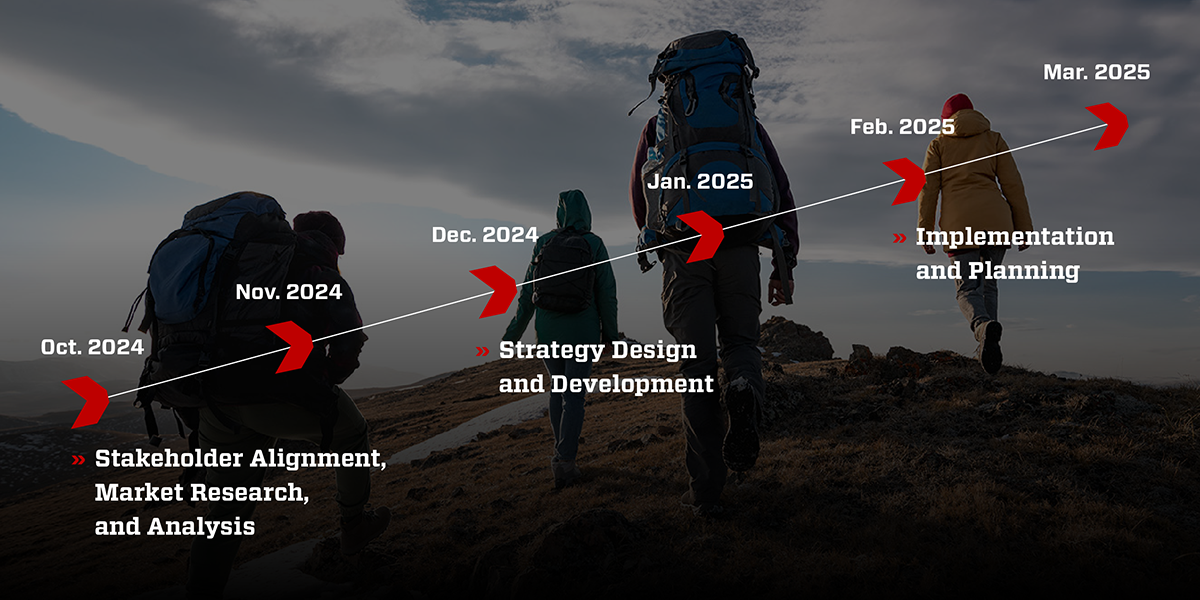Under the leadership of Dean Kurt Dirks, the David Eccles School of Business has embarked on a strategic planning process to chart our course for success and shape our future.
Vision
To be the business school of the Mountain West and a national leader, we will empower every student to reach their peak, and we will reach beyond campus to help business, people, and the economy thrive.
Planning Process
Objectives

Objectives
Planning Process
Strategic Planning Overview
The purpose of the strategic plan is to set a new vision and strategy for the Eccles School to match the University’s 2030 goal to become a top-10 public university.

Stakeholder Alignment, Market Research, and Analysis
- Current State Analysis
- Stakeholder Engagement
- Expert Interviews
- Market Research
- Identify Criteria
Strategy Design and Development
- Strategy Component Formulation
- Alignment Testing
- Define Strategic Components
- Finalize Strategic Plan
Implementation and Planning
- Success Metrics
- Implementation Mapping
- Stakeholder Feedback
- Alignment with University and Business School
Research Overview
Comprehensive internal and external research to inform strategic decision making in the planning phase.
Interviews Completed
- University Leadership
- Business School Leadership
- External Funders
- External Experts
Undergraduate Student Survey
Feedback was gathered from in-state, out-of-state, and international students across all grades and majors.
External Research
Comprehensive research of comparable and aspirational universities across key factors, programs, rankings, and more to better understand best-in-class practices and opportunities for improvement.
Focus Groups & Meetings
Students
- Undergraduate Student Representatives
- EMBA
- MBA
- PMBA
- OMBA
- Specialty Graduate Programs
Faculty and Staff
- Centers and Institutes Meeting
- Faculty Meeting
- Staff Meeting
- Department Chairs Meeting
Alumni and Donors
- Eccles Advisory Board
- DEAN Board
- Small Group Dinners
- One-on-One Meetings
Strategic Planning Roadmap
Charter
Development

Prioritization
and Integration

- Define focus area
- Articulate value proposition of focus area
- Highlight overarching objectives
- List potential initiatives for impact
- Level up charters to an overarching strategy
- Align on milestones, metrics, and outcomes
- Determine areas of integration across the school
- Prioritization of overlapping elements
Implementation
Strategy/Planning

Implementation
Execution (by Charter)

- Framework for execution of overarching strategy
- Core actions, steps, and processes that will drive implementation efforts
- Identify potential risks and mitigations
- Develop implementation considerations
- Charter owners populate each charter framework
- Develop detailed operational plans
- Timeline and roadmaps
- Define roles and responsibilities (task force, cross-function)
Charter
Development

- Define focus area
- Articulate value proposition of focus area
- Highlight overarching objectives
- List potential initiatives for impact
Prioritization
and Integration

- Level up charters to an overarching strategy
- Align on milestones, metrics, and outcomes
- Determine areas of integration across the school
- Prioritization of overlapping elements
Implementation
Strategy/Planning

- Framework for execution of overarching strategy
- Core actions, steps, and processes that will drive implementation efforts
- Identify potential risks and mitigations
- Develop implementation considerations
Implementation
Execution (by Charter)

- Charter owners populate each charter framework
- Develop detailed operational plans
- Timeline and roadmaps
- Define roles and responsibilities (task force, cross-function)
Strategy Updates
Strategic Priorities
Our strategic priorities represent the highest level objectives aligned with our vision.

| Creating Societal Impact |
|---|
| Overview: Expand impact to help Utah’s people, businesses, and economy thrive. |
| Rationale: Real-world impact, created by students, faculty, and staff, is the key output of the Eccles School’s activities. |
| Driving Student Success |
|---|
| Overview: Help every student seek and reach their peak via personal, academic, and professional growth. |
| Rationale: Focusing on student success means that each student grows, learns practical skills, and enjoys their time as part of the David Eccles School of Business. |
| Building Legacy |
|---|
| Overview: Drive lasting influence through purposeful growth and enduring excellence. |
| Rationale: Long-term sustainability is essential to ensuring the Eccles School’s enduring success and ability to fuel future growth. |
Creating Societal Impact
Overview: Expand impact to help Utah’s people, businesses, and economy thrive.
Rationale: Real-world impact, created by students, faculty, and staff, is the key output of the Eccles School’s activities.
Driving Student Success
Overview: Help every student seek and reach their peak via personal, academic, and professional growth.
Rationale: Focusing on student success means that each student grows, learns practical skills, and enjoys their time as part of the David Eccles School of Business.
Building Legacy
Overview: Drive lasting influence through purposeful growth and enduring excellence.
Rationale: Long-term sustainability is essential to ensuring the Eccles School’s enduring success and ability to fuel future growth.
Strategy Leadership
- Kurt Dirks, Dean, Professor of Leadership
- Katie Hoffman Abby, Vice President, U Career Success; Assistant Dean, David Eccles School of Business
- Katie Amundsen, Assistant Dean, Alumni Relations and Development
- Allison Boxer, Asst. Professor, Strategic Advisor to the Dean; James Lee Sorenson Presidential Endowed Chair in Applied Research
- Jennifer Brown, Senior Associate Dean of Faculty; Professor, Department of Entrepreneurship and Strategy; H. Brent Beesley Endowed Professor
- Michael Lewis, Assistant Dean, Finance and Operations; Professor (Lecturer), School of Accounting
- Catherine Smith, Senior Director, Marketing and Communications
- Stephen Stubben, Senior Associate Dean, Research; Professor, School of Accounting; Francis Armstrong Madsen Endowed Professor
- Jess Taverna, Associate Dean, Undergraduate Programs
- Brad Vierig, Associate Dean, Graduate Programs and Executive Education




